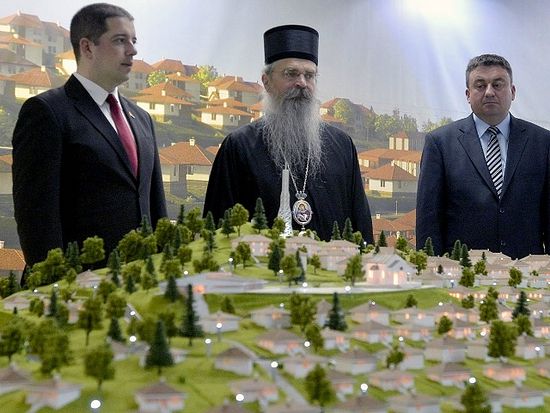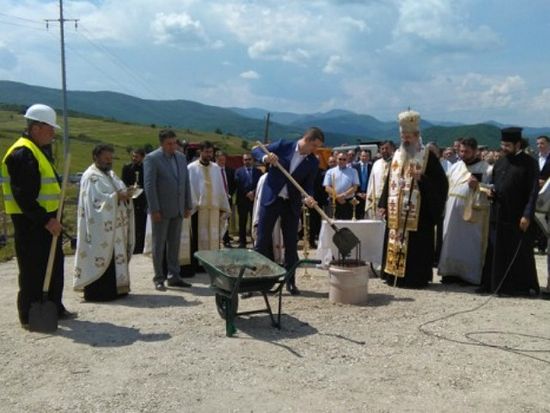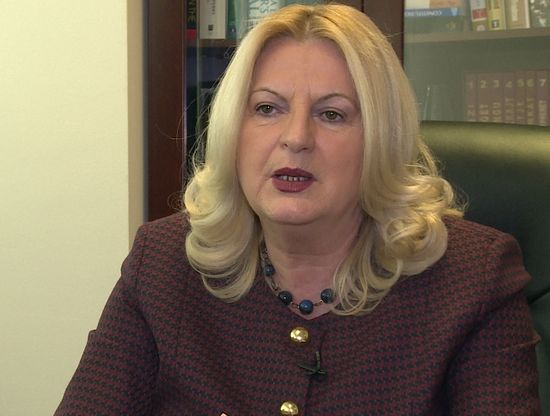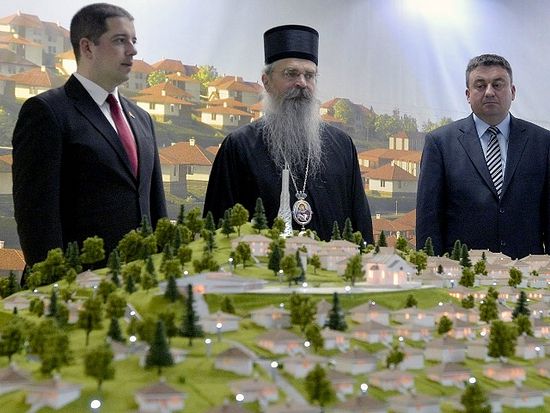
KOSOVO VOWS TO HALT SERB REFUGEE SETTLEMENT

Marko Djuric, head of the Serbian government office for Kosovo, launches the construction work. Photo: BETA.

Edita Tahiri, Kosovo’s minister for dialogue. Photo: BETA.

Marko Djuric presents the model for the Sunny Valley project. Photo:kim.gov.rs
Balkan Transitional Justice – July 2016
The recent start of construction on Sunny Valley, the first big returnee settlement that the Serbian government plans to build in the northern Kosovo town of Zvecan, has caused outrage in Pristina.
Some media outlets have described the move as a neo-colonial attempt by Belgrade to consolidate its influence over the Serb-majority north, while Kosovo’s Prime Minister Isa Mustafa said that the project has “no legal permits” and that the construction will not be allowed to continue.
Kosovo Albanian activists in the area announced on Monday that they will stage a protest if the building work continues.
In Belgrade, however, Serbian officials claim the project has the full support of the international community.
The head of the Serbian government’s Office for Kosovo and Metohija, Marko Djuric, said that Serbia wants “a constructive debate on the rights of returnees”, not what he described as “chauvinistic bickering”.
Serbs in north Kosovo, who sometimes feel they are the victims of the policies of both Belgrade and Pristina, fear the project may be stalled if both sides do not resolve their differences.
Marko Miletic, a 50-year-old Serb in Zvecan, said that Belgrade and Pristina should sit down and reach an agreement that will ensure post-war returnees a decent future.
“Serbia is not building a barracks or an army base in Zvecan, but roofs over the heads of refugees who were banished by Albanian extremists,” Miletic told BIRN.
If completed, Sunny Valley will provide around 300 houses for about 1,500 Kosovo Serb refugees, plus a shopping mall, a kindergarten, an ambulance service and a sports centre.
Ivan Todosijevic, the president of the Serbian government’s temporary authority for the Zvecan municipality, told BIRN that the returnees will also be given jobs.
Todosijevic denied the claims from Pristina that the settlement is illegal, saying that it is being built on land owned by the Serbian Orthodox Church and that all the necessary paperwork was completed according to Serbian law.
“If there was will and understanding on the part of Pristina, they would see that there is nothing disputable about the documentation,” Todosijevic told BIRN.
Serbia accused of ‘illegal interference’
They also criticised the Kosovo government for being powerless to stop Serbia from interfering in municipalities in the Serb-majority north and creating tensions between Serbs and Albanians in the area.On the day when the foundations were laid for Sunny Valley, some media in Pristina published front-page headlines describing the project as “the start of colonisation” and “the return of Serbia to Kosovo”.
Edita Tahiri, the Kosovo minister in charge of dialogue with Serbia, accused Belgrade of interfering with Kosovo’s internal affairs.
She argued that Belgrade wanted to extend its influence over the Serb-majority north of Kosovo by building refugee settlements and thus increasing the number of Serbs living there.
“Such projects have proven to be political and aimed at changing the structure of the population in the north of Kosovo,” Tahiri said.
The government meanwhile accused Belgrade of encouraging its representatives in northern Kosovo to flout the law.
“The government of Kosovo is committed to establish normal conditions for all its citizens and their return to their homes, regardless of their ethnicity. This process will be possible and sustainable only by respecting laws that provide security and stability for all citizens and in line with EU integration processes,” it said in a statement.
Property disputes between Belgrade and Pristina have yet to be resolved in the ongoing EU-mediated dialogue in Brussels aimed at normalising relations between Serbia and its former province, with both countries claiming to own most state properties.
Opposition parties in Pristina have also criticised the Sunny Valley project, with the Alliance for the Future of Kosovo party arguing that “the government of Kosovo has a constitutional obligation to defend the country from foreign influences and breaches of sovereignty and territorial integrity”.
“The continuation of dialogue between Pristina and Belgrade in this situation, when Serbia is disrespecting the state or the government in Pristina, is pointless,” the party said in a statement.
However, not all of the reactions from Pristina were negative; the deputy speaker of parliament, Xhavit Haliti, who is also an official with the ruling Democratic Party of Kosovo, argued that Serbia had the right to build the settlement in line with UN special envoy Martti Ahtisaari’s 2007 plan to settle Kosovo’s status.
“In line with the Ahtisaari Plan and the constitution of Kosovo, Serbia has the right to help Serbs in Kosovo in many areas, including infrastructure,” Haliti told media.
He argued that Kosovo’s environment ministry could only block the construction project if it did not conform to the Zvecan municipality’s urban planning regulations.
Serbia ‘trying to restore justice’
The head of the Serbian government’s Office for Kosovo and Metohija, Marko Djuric, has argued that the Sunny Valley project is an attempt to “rectify an injustice”.
Djuric dismissed the ‘colonisation’ allegations as inaccurate.
“How can someone talk about alleged colonisation by the people who have always lived there and have all the documents and are even considered citizens of Kosovo and Metohija under Pristina’s laws?” he asked.
Analysts said however that Pristina and Belgrade need to find common ground over the issue of the Serb returnees, which remains highly sensitive even though 17 years have passed since the war ended.
Nedzmedin Spahiu, a political analyst and director of the Kosovo-based TV Mitrovica, says that Serbs in Kosovo need help, but such initiatives cannot be unilateral.
“Any help from the government of Serbia for the Serb community in Kosovo is welcome and it is help for Kosovo as a country at the same time. Ahtisaari’s plan and the constitution of Kosovo enable Serbia to do this, but it must work in agreement and with the consent of the authorities in Pristina,” Spahiu told BIRN.
Strahinja Mirkovic, a professor at the Law Faculty in Mitrovica, argued that the Sunny Valley project has become politicised.
“The project to construct the returnee settlement is of a humanitarian character and is in line with the provisions of the Brussels Agreement [between Belgrade and Pristina on normalising relations], which envisages Serbia’s support for municipalities in Kosovo,” Mirkovic told BIRN.
“Pristina has a problem because the settlement is mostly being built using funds from the government of Serbia, because if the project was by some chance implemented and financed by the European Reconstruction Agency, which reconstructed thousands of houses for Albanians from Kosovo, the Pristina authorities would not have reacted like this,” he said.
Serb refugees slow to return
The post-war return process started in 2002 with the help of a task force involving the heads of international peace missions in Kosovo.
So-called ‘Go-and-See’ trips were organised for displaced Serbs, who were taken in armed vehicles by NATO’s Kosovo force, KFOR, to houses which had been torched, demolished or expropriated.
But these initial attempts were largely unsuccessful, recalled Nenad Radosavljevic, who was an adviser on the issue of returnees to the UN’s mission in Kosovo, UNMIK, from 2002 to 2008.
“On paper, this project was comprehensive. However, in the field, from the very top to the mayors at that time, there were permanent obstructions to the return process from nearly all sides,” Radosavljevic told BIRN.
“When the task force made a decision on the return of Serbs, representatives of neighbouring Albanian villages and municipal authorities in that part of Kosovo usually insisted that the environment was not suitable due to the hostility of the local population. On the other hand, in towns where the local Albanian population was not expressly against the return of Serbs, high representatives of KFOR made assessments that the process of return could not be realised because the area was in the so-called ‘red zone’ and the international peace mission could not guarantee safety,” he added.
Dalibor Jevtic, Kosovo’s Minister for Returnees and Communities, said that everyone who was displaced by the conflict has the right to return to Kosovo, but Serbs were still not doing so in large numbers because of security fars.
“Over the first five months of this year, only 101 people from the Serbian community returned to Kosovo. More than 10,000 displaced Serbs have submitted requests to my ministry to come back to Kosovo and they have been waiting for over 10 years to be enabled to do so,” Jevtic said.
From 2000 until 2010, only 10,000 of a total of 218,000 displaced Serbs returned to Kosovo, according to the UN refugee agency, UNHCR.
Jevtic argued that the Sunny Valley returnee settlement in Zvecan was “a real solution for the refugees” that could boost the number of returnees.
“I am sorry that this is becoming a political issue,” he said.

[…] Source link […]
231894 674537I feel your suggestion would be helpful for me. I will let you know if its function for me too. Thank you for sharing this beautiful articles. thanks a lot 411425
552056 351669What a lovely weblog. I will undoubtedly be back once again. Please maintain writing! 258367